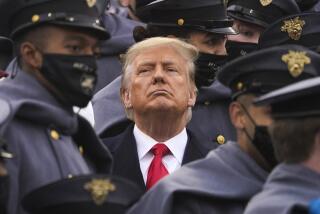Croatia Says It Will Fight if Yugoslav Army Intervenes in Unrest
- Share via
ZAGREB, Yugoslavia — Croatia will rise up in arms to defend its sovereignty if federal authorities order the army to quell ethnic unrest in the newly democratic republic, Croatian President Franjo Tudjman vowed Thursday.
Hours later, according to wire service reports, the Croatian government announced that the republic was mobilizing its militia reserves. But it called it a “routine check” of the reserve units.
Tudjman suggested that a Communist-inspired military coup was in the making to impose a Stalinist leadership on Croatia, Yugoslavia’s second-largest republic. The charge was denied in Belgrade by the federal defense minister.
Ethnic tensions have escalated sharply in Croatia this week after minority Serbs blew up railroad tracks, seized caches of weapons and imposed a blockade that has severed the Croatian capital of Zagreb from the Adriatic Coast, on which the republic is economically dependent.
Croatian leaders are struggling to prevent violent retaliation that could unleash civil war, but nationalist forces are itching to vent centuries-old hostilities, and the leadership does not know how long it can demand tolerance, Tudjman said.
“We get hundreds of telegrams of support daily from Croats in this country and in other parts of the world wanting to volunteer to join military forces to defend Croatia,” Tudjman told foreign reporters in Zagreb. “We hope this won’t be necessary. But Croatia simply won’t allow any regression into a Stalinist system or monopolistic tyranny.”
He accused Communist authorities in Belgrade of goading Yugoslavia into a bloody confrontation like last December’s revolution in Romania, where dictator Nicolae Ceausescu’s use of the army to suppress anti-government demonstrators triggered a popular uprising that many soldiers eventually joined.
Relations among Yugoslavia’s historically squabbling republics have eroded dangerously since Croatia and Slovenia elected democratic leaderships this spring, adding a new political conflict with Communist Serbia to the mountain of long-suppressed ethnic and religious differences.
Borisav Jovic, the Serb who currently holds Yugoslavia’s rotating presidency, lashed out at Croatia and Slovenia in a speech published Thursday, accusing the two republics of stoking the nationalist fires that are splitting Yugoslavia along ethnic lines and threatening civil war.
“The wave of hatred and nationalist prejudices threatens to take us back to our bloody past,” Jovic said.
Serbia has for months been locked in a tense standoff with Croatia and Slovenia over the future of the troubled Yugoslav nation, with Serbia advocating a highly centralized federation governed from Belgrade and the two democratic republics seeking a loose confederation of independent states, along the lines of the European Community.
“National frictions and numerous confrontations have threatened to turn into open conflicts which would in our conditions inevitably result in a civil war,” Jovic said. He made it clear that the federal leadership will take a hard line against any efforts by Slovenia and Croatia to secede, and this fueled rumors in Zagreb of impending military intervention.
Danas, a respected weekly newspaper in Zagreb, reported in its most recent edition that high-level military officers had discussed the possibility of a military coup to end the unrest in Croatia.
Defense Minister Veljko Kadijevic described the rumors as “vulgar provocations.”
The army is made up of recruits from throughout Yugoslavia, and their loyalty to the federal government is likely subordinate to their ethnic allegiance. But two-thirds of the officers are Serbs, and most of the military hierarchy is or was part of the Communist Party, which controls the Serbian and federal governments in Belgrade.
Tudjman, the Croatian president, confirmed that Zagreb officials are aware of “certain worrisome signs coming from the army.” He warned that any intervention in Croatia would ignite civil war.
Serbia opposes Croatian independence on ethnic and economic grounds. Belgrade says that the 600,000 Serbs in Croatia would be threatened in an independent state.
More to Read
Sign up for Essential California
The most important California stories and recommendations in your inbox every morning.
You may occasionally receive promotional content from the Los Angeles Times.










